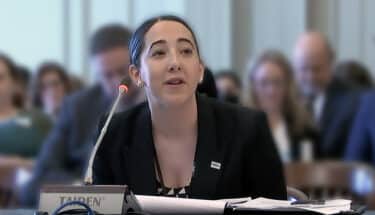
Ray Cantor – VP, Government Affairs
My name is Raymond Cantor and I am Vice President of Government Affairs with the New Jersey Business & Industry Association. NJBIA’s members employ one million people in the state and we are the largest statewide business association in the nation. I want to thank the Chairman and this committee for the opportunity to testify today. I especially want to thank the many members who met with us to hear our concerns with this legislation, especially the sponsor and leadership.
We are in the midst of an unprecedented pandemic and corresponding economic emergency. As we struggled to meet society’s immediate public safety and healthcare needs in the onset of this public health crisis, as well as to ensure that essential services were provided, many of our citizens bravely continued their work to meet society’s needs. These workers should be commended and protected. In those early days, once we better learned how to fight against the spread of the virus, we saw businesses and institutions take effective measures such as mandating masks, enforcing social distancing, and placing strategic barriers. Government, too, acted with Congress taking early action through the adoption of the CARES Act, which ensured that workers who contracted the coronavirus and could not work were properly compensated and received necessary healthcare.
Having said that, NJBIA recognizes the intent of the legislation to ensure that our essential employees who become ill receive the benefits they need. We believe that the goal can be met, without overwhelming and bankrupting the workers compensation system by making a few reasonable amendments to better tailor this legislation to those who may actually deserve the presumption established in the legislation.
First, the definition of essential employee needs to be modified to better reflect the elevated risk an employee had in working through the pandemic. Not every employee who was deemed essential in the Governor’s executive orders actually had an elevated risk of contracting the virus. Those who had contact with people who had the virus or interacted with the public were at a greater risk of contracting COVID-19 than an employee who was in the back office and who had no such contacts. This legislation should be tailored to reflect this reality and to ensure that we expend our resources as necessary and only as needed.
In a similar vein, we should recognize that essential employees who went to work during the time of the stay-at-home order and contracted the virus have a legitimate claim to make that they were more likely to have contracted the virus while at work.
However, once the stay-at-home orders were eased and eventually lifted, the basis for the presumption also dissipates. It is one thing to presume that an employee contracted the virus at work when their only movements are from home to work and back again. But it is illogical to apply the same presumption when that employee is going to the beach, to restaurants, visiting friends, and largely engaging people in a wide manner of ways outside of their employment. Employees who were compelled to go to work during the lockdown were in a much different state than workers today who are largely going about their daily lives.
We ask that this reality be recognized by limiting the extent of the term of the presumption to that period when the stay-at-home orders were in place. This change reflects the elevated risk experienced by essential employees during the pandemic without placing an undue burden on the workers compensation system and the employers who fund that system.
Finally, we want to ensure that the costs of this legislation are not unfairly borne by any one segment of the business community, but are better spread out so that they are relatively affordable. The bill has language that attempts to accomplish this, but we are offering technical changes that will more precisely effectuate that intent.
If this bill is changed along the lines we outlined we can ensure that all essential employees who worked during the lock down phase of the pandemic and who experienced an elevated risk of contracting the virus will be economically protected. We will also ensure that the workers compensation system will remain solvent and that the employers who pay into that system, and who are experiencing their own economic crisis, are not unduly impacted.
Thank you for your consideration.





